International Hospitality Management: IHG Strategic Analysis Report
VerifiedAdded on 2022/12/12
|13
|4131
|111
Report
AI Summary
This report delves into the strategic analysis of Intercontinental Hotel Group (IHG), a leading multinational hospitality organization. It begins with an introduction to hospitality management and the background of IHG, including its services and global presence. A SWOT analysis identifies IHG's strengths, such as its asset-light business model and global presence, alongside weaknesses like a lack of a strong information system and the impact of increased competition. Opportunities include the growth in international travel and the use of technology, while threats include low-cost competitors and global pandemics. The report then examines the emerging market of China, using PESTEL analysis to assess the political, economic, social, technological, environmental, and legal factors impacting IHG's operations. Finally, the report explores Porter's generic strategies, including cost leadership, differentiation, and focus strategies, and how IHG can implement them to gain a competitive advantage in the market. The report concludes with recommendations for IHG's strategic direction in the international hospitality industry.
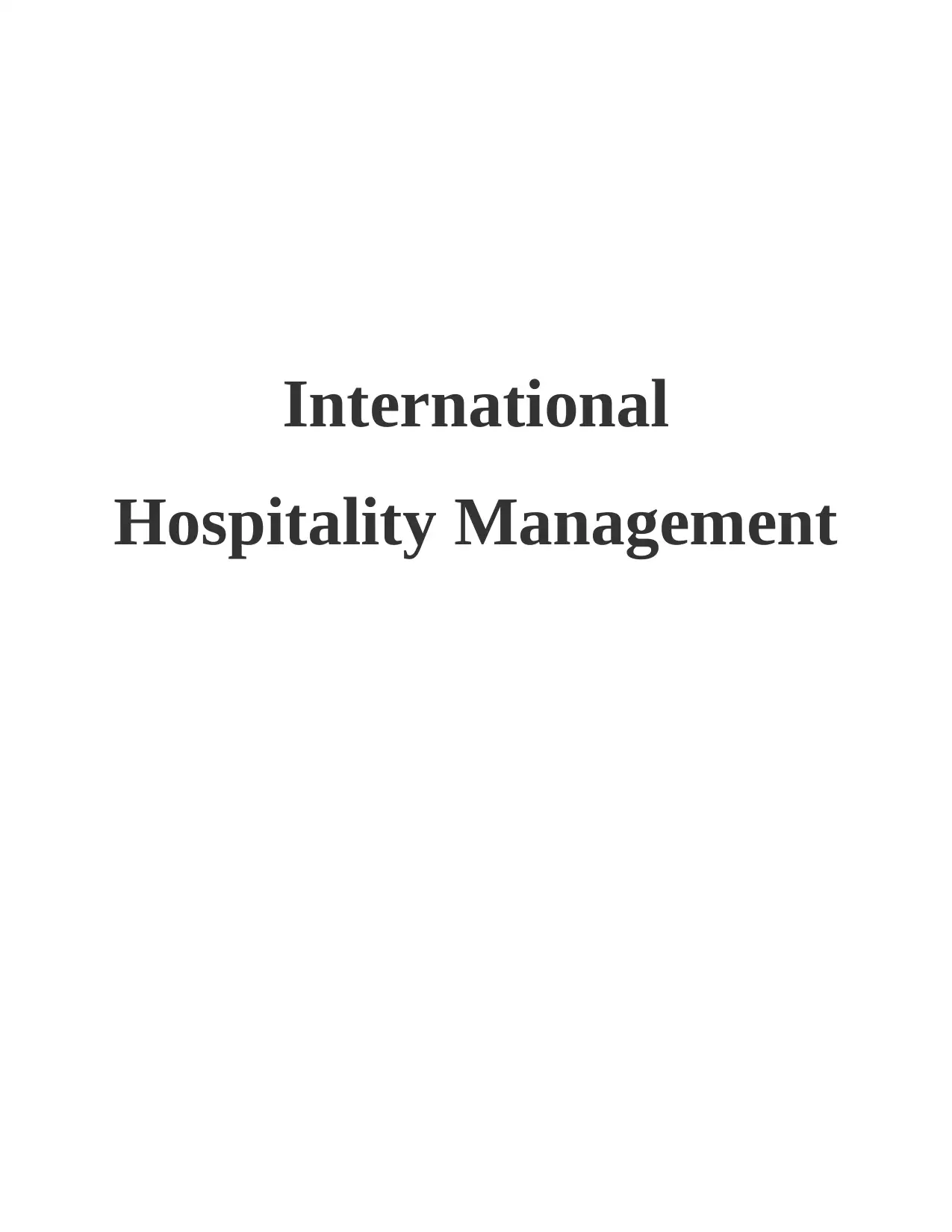
International
Hospitality Management
Hospitality Management
Paraphrase This Document
Need a fresh take? Get an instant paraphrase of this document with our AI Paraphraser
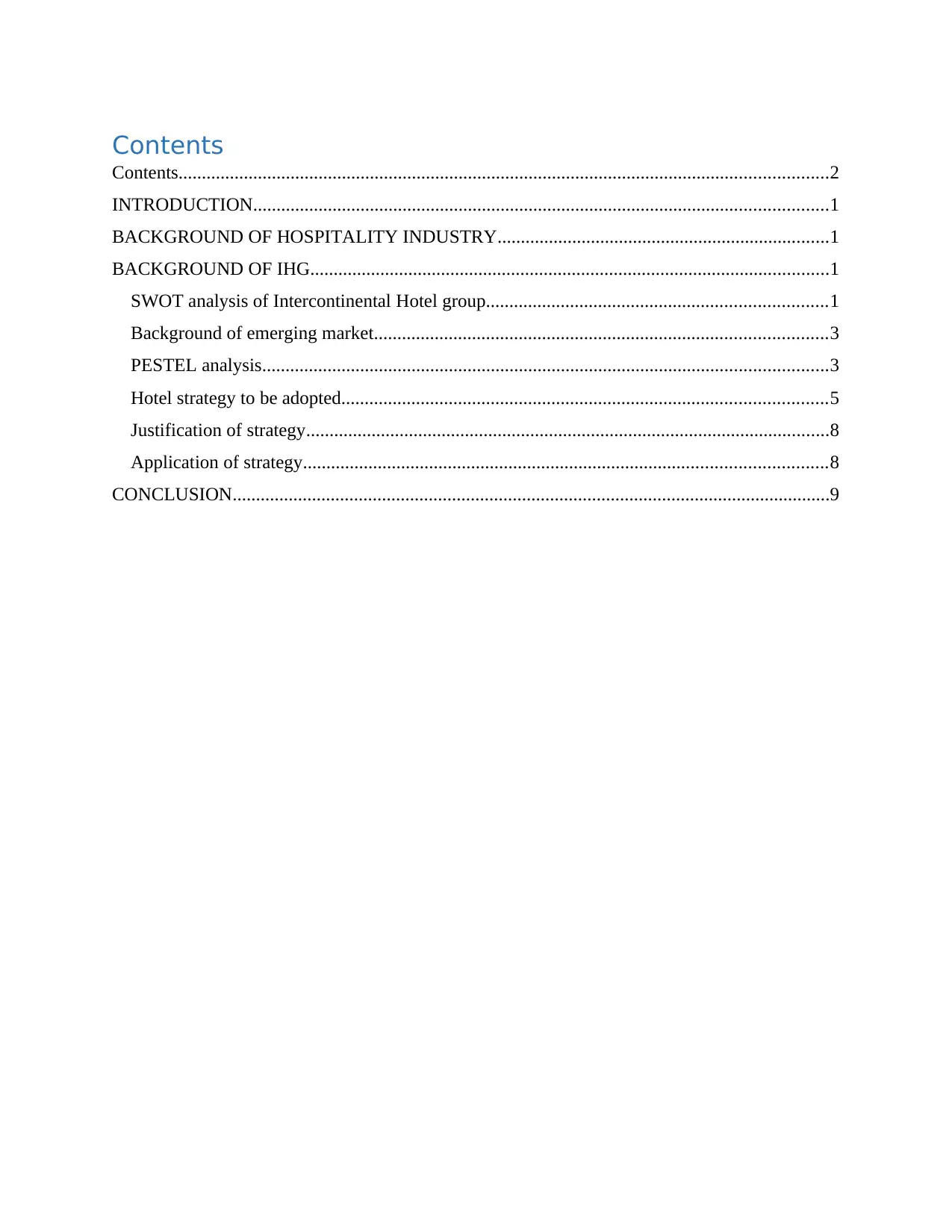
Contents
Contents...........................................................................................................................................2
INTRODUCTION...........................................................................................................................1
BACKGROUND OF HOSPITALITY INDUSTRY.......................................................................1
BACKGROUND OF IHG...............................................................................................................1
SWOT analysis of Intercontinental Hotel group.........................................................................1
Background of emerging market.................................................................................................3
PESTEL analysis.........................................................................................................................3
Hotel strategy to be adopted........................................................................................................5
Justification of strategy................................................................................................................8
Application of strategy................................................................................................................8
CONCLUSION................................................................................................................................9
Contents...........................................................................................................................................2
INTRODUCTION...........................................................................................................................1
BACKGROUND OF HOSPITALITY INDUSTRY.......................................................................1
BACKGROUND OF IHG...............................................................................................................1
SWOT analysis of Intercontinental Hotel group.........................................................................1
Background of emerging market.................................................................................................3
PESTEL analysis.........................................................................................................................3
Hotel strategy to be adopted........................................................................................................5
Justification of strategy................................................................................................................8
Application of strategy................................................................................................................8
CONCLUSION................................................................................................................................9
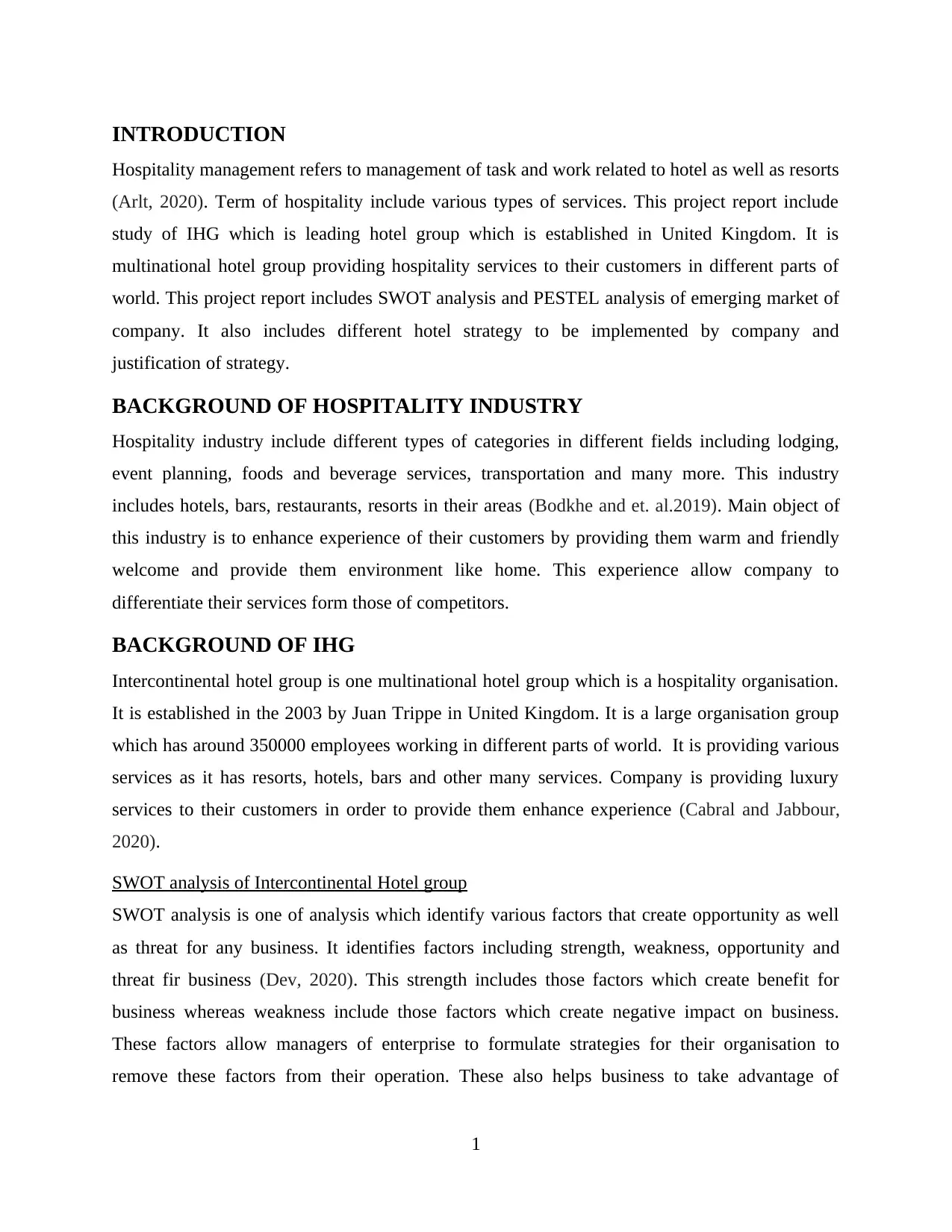
INTRODUCTION
Hospitality management refers to management of task and work related to hotel as well as resorts
(Arlt, 2020). Term of hospitality include various types of services. This project report include
study of IHG which is leading hotel group which is established in United Kingdom. It is
multinational hotel group providing hospitality services to their customers in different parts of
world. This project report includes SWOT analysis and PESTEL analysis of emerging market of
company. It also includes different hotel strategy to be implemented by company and
justification of strategy.
BACKGROUND OF HOSPITALITY INDUSTRY
Hospitality industry include different types of categories in different fields including lodging,
event planning, foods and beverage services, transportation and many more. This industry
includes hotels, bars, restaurants, resorts in their areas (Bodkhe and et. al.2019). Main object of
this industry is to enhance experience of their customers by providing them warm and friendly
welcome and provide them environment like home. This experience allow company to
differentiate their services form those of competitors.
BACKGROUND OF IHG
Intercontinental hotel group is one multinational hotel group which is a hospitality organisation.
It is established in the 2003 by Juan Trippe in United Kingdom. It is a large organisation group
which has around 350000 employees working in different parts of world. It is providing various
services as it has resorts, hotels, bars and other many services. Company is providing luxury
services to their customers in order to provide them enhance experience (Cabral and Jabbour,
2020).
SWOT analysis of Intercontinental Hotel group
SWOT analysis is one of analysis which identify various factors that create opportunity as well
as threat for any business. It identifies factors including strength, weakness, opportunity and
threat fir business (Dev, 2020). This strength includes those factors which create benefit for
business whereas weakness include those factors which create negative impact on business.
These factors allow managers of enterprise to formulate strategies for their organisation to
remove these factors from their operation. These also helps business to take advantage of
1
Hospitality management refers to management of task and work related to hotel as well as resorts
(Arlt, 2020). Term of hospitality include various types of services. This project report include
study of IHG which is leading hotel group which is established in United Kingdom. It is
multinational hotel group providing hospitality services to their customers in different parts of
world. This project report includes SWOT analysis and PESTEL analysis of emerging market of
company. It also includes different hotel strategy to be implemented by company and
justification of strategy.
BACKGROUND OF HOSPITALITY INDUSTRY
Hospitality industry include different types of categories in different fields including lodging,
event planning, foods and beverage services, transportation and many more. This industry
includes hotels, bars, restaurants, resorts in their areas (Bodkhe and et. al.2019). Main object of
this industry is to enhance experience of their customers by providing them warm and friendly
welcome and provide them environment like home. This experience allow company to
differentiate their services form those of competitors.
BACKGROUND OF IHG
Intercontinental hotel group is one multinational hotel group which is a hospitality organisation.
It is established in the 2003 by Juan Trippe in United Kingdom. It is a large organisation group
which has around 350000 employees working in different parts of world. It is providing various
services as it has resorts, hotels, bars and other many services. Company is providing luxury
services to their customers in order to provide them enhance experience (Cabral and Jabbour,
2020).
SWOT analysis of Intercontinental Hotel group
SWOT analysis is one of analysis which identify various factors that create opportunity as well
as threat for any business. It identifies factors including strength, weakness, opportunity and
threat fir business (Dev, 2020). This strength includes those factors which create benefit for
business whereas weakness include those factors which create negative impact on business.
These factors allow managers of enterprise to formulate strategies for their organisation to
remove these factors from their operation. These also helps business to take advantage of
1
⊘ This is a preview!⊘
Do you want full access?
Subscribe today to unlock all pages.

Trusted by 1+ million students worldwide
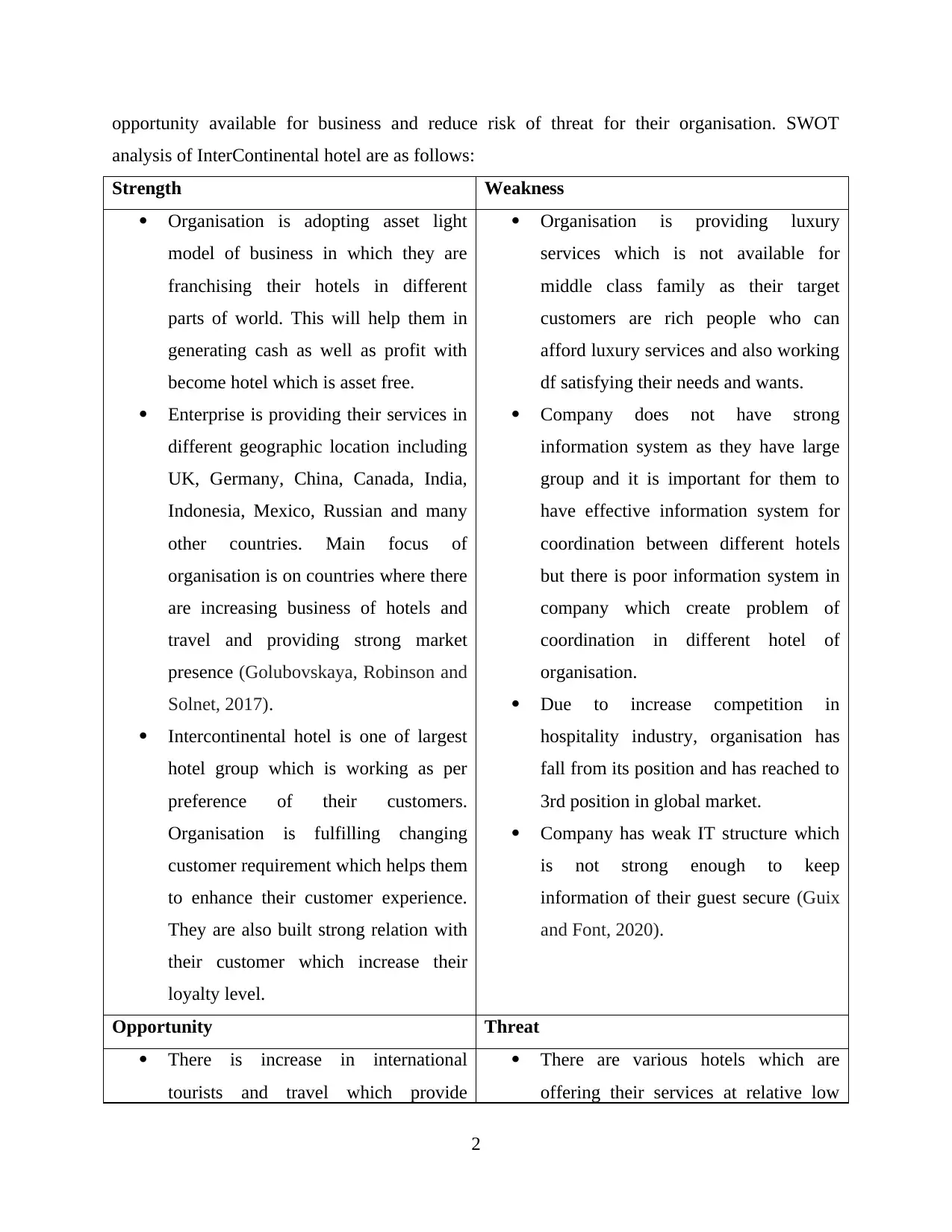
opportunity available for business and reduce risk of threat for their organisation. SWOT
analysis of InterContinental hotel are as follows:
Strength Weakness
Organisation is adopting asset light
model of business in which they are
franchising their hotels in different
parts of world. This will help them in
generating cash as well as profit with
become hotel which is asset free.
Enterprise is providing their services in
different geographic location including
UK, Germany, China, Canada, India,
Indonesia, Mexico, Russian and many
other countries. Main focus of
organisation is on countries where there
are increasing business of hotels and
travel and providing strong market
presence (Golubovskaya, Robinson and
Solnet, 2017).
Intercontinental hotel is one of largest
hotel group which is working as per
preference of their customers.
Organisation is fulfilling changing
customer requirement which helps them
to enhance their customer experience.
They are also built strong relation with
their customer which increase their
loyalty level.
Organisation is providing luxury
services which is not available for
middle class family as their target
customers are rich people who can
afford luxury services and also working
df satisfying their needs and wants.
Company does not have strong
information system as they have large
group and it is important for them to
have effective information system for
coordination between different hotels
but there is poor information system in
company which create problem of
coordination in different hotel of
organisation.
Due to increase competition in
hospitality industry, organisation has
fall from its position and has reached to
3rd position in global market.
Company has weak IT structure which
is not strong enough to keep
information of their guest secure (Guix
and Font, 2020).
Opportunity Threat
There is increase in international
tourists and travel which provide
There are various hotels which are
offering their services at relative low
2
analysis of InterContinental hotel are as follows:
Strength Weakness
Organisation is adopting asset light
model of business in which they are
franchising their hotels in different
parts of world. This will help them in
generating cash as well as profit with
become hotel which is asset free.
Enterprise is providing their services in
different geographic location including
UK, Germany, China, Canada, India,
Indonesia, Mexico, Russian and many
other countries. Main focus of
organisation is on countries where there
are increasing business of hotels and
travel and providing strong market
presence (Golubovskaya, Robinson and
Solnet, 2017).
Intercontinental hotel is one of largest
hotel group which is working as per
preference of their customers.
Organisation is fulfilling changing
customer requirement which helps them
to enhance their customer experience.
They are also built strong relation with
their customer which increase their
loyalty level.
Organisation is providing luxury
services which is not available for
middle class family as their target
customers are rich people who can
afford luxury services and also working
df satisfying their needs and wants.
Company does not have strong
information system as they have large
group and it is important for them to
have effective information system for
coordination between different hotels
but there is poor information system in
company which create problem of
coordination in different hotel of
organisation.
Due to increase competition in
hospitality industry, organisation has
fall from its position and has reached to
3rd position in global market.
Company has weak IT structure which
is not strong enough to keep
information of their guest secure (Guix
and Font, 2020).
Opportunity Threat
There is increase in international
tourists and travel which provide
There are various hotels which are
offering their services at relative low
2
Paraphrase This Document
Need a fresh take? Get an instant paraphrase of this document with our AI Paraphraser
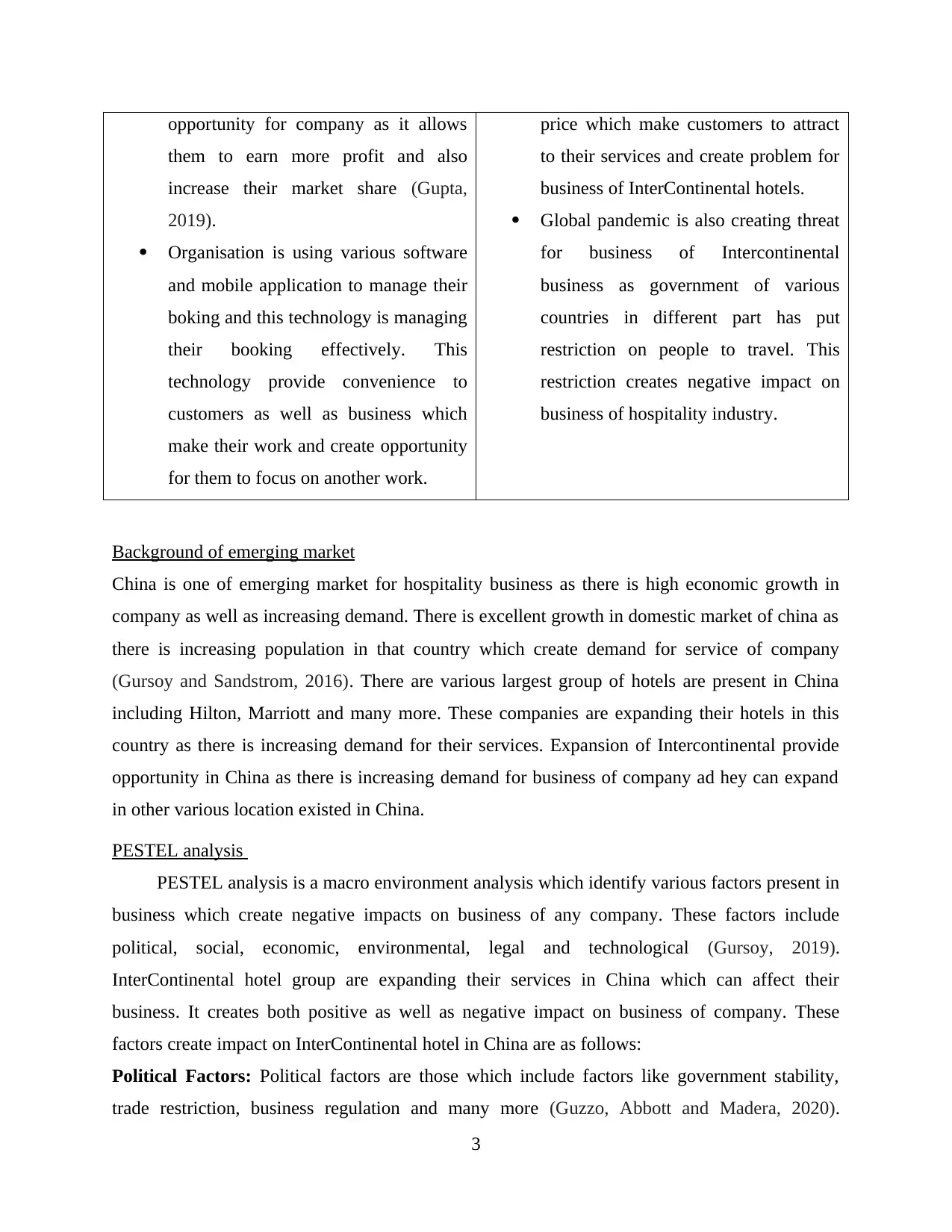
opportunity for company as it allows
them to earn more profit and also
increase their market share (Gupta,
2019).
Organisation is using various software
and mobile application to manage their
boking and this technology is managing
their booking effectively. This
technology provide convenience to
customers as well as business which
make their work and create opportunity
for them to focus on another work.
price which make customers to attract
to their services and create problem for
business of InterContinental hotels.
Global pandemic is also creating threat
for business of Intercontinental
business as government of various
countries in different part has put
restriction on people to travel. This
restriction creates negative impact on
business of hospitality industry.
Background of emerging market
China is one of emerging market for hospitality business as there is high economic growth in
company as well as increasing demand. There is excellent growth in domestic market of china as
there is increasing population in that country which create demand for service of company
(Gursoy and Sandstrom, 2016). There are various largest group of hotels are present in China
including Hilton, Marriott and many more. These companies are expanding their hotels in this
country as there is increasing demand for their services. Expansion of Intercontinental provide
opportunity in China as there is increasing demand for business of company ad hey can expand
in other various location existed in China.
PESTEL analysis
PESTEL analysis is a macro environment analysis which identify various factors present in
business which create negative impacts on business of any company. These factors include
political, social, economic, environmental, legal and technological (Gursoy, 2019).
InterContinental hotel group are expanding their services in China which can affect their
business. It creates both positive as well as negative impact on business of company. These
factors create impact on InterContinental hotel in China are as follows:
Political Factors: Political factors are those which include factors like government stability,
trade restriction, business regulation and many more (Guzzo, Abbott and Madera, 2020).
3
them to earn more profit and also
increase their market share (Gupta,
2019).
Organisation is using various software
and mobile application to manage their
boking and this technology is managing
their booking effectively. This
technology provide convenience to
customers as well as business which
make their work and create opportunity
for them to focus on another work.
price which make customers to attract
to their services and create problem for
business of InterContinental hotels.
Global pandemic is also creating threat
for business of Intercontinental
business as government of various
countries in different part has put
restriction on people to travel. This
restriction creates negative impact on
business of hospitality industry.
Background of emerging market
China is one of emerging market for hospitality business as there is high economic growth in
company as well as increasing demand. There is excellent growth in domestic market of china as
there is increasing population in that country which create demand for service of company
(Gursoy and Sandstrom, 2016). There are various largest group of hotels are present in China
including Hilton, Marriott and many more. These companies are expanding their hotels in this
country as there is increasing demand for their services. Expansion of Intercontinental provide
opportunity in China as there is increasing demand for business of company ad hey can expand
in other various location existed in China.
PESTEL analysis
PESTEL analysis is a macro environment analysis which identify various factors present in
business which create negative impacts on business of any company. These factors include
political, social, economic, environmental, legal and technological (Gursoy, 2019).
InterContinental hotel group are expanding their services in China which can affect their
business. It creates both positive as well as negative impact on business of company. These
factors create impact on InterContinental hotel in China are as follows:
Political Factors: Political factors are those which include factors like government stability,
trade restriction, business regulation and many more (Guzzo, Abbott and Madera, 2020).
3
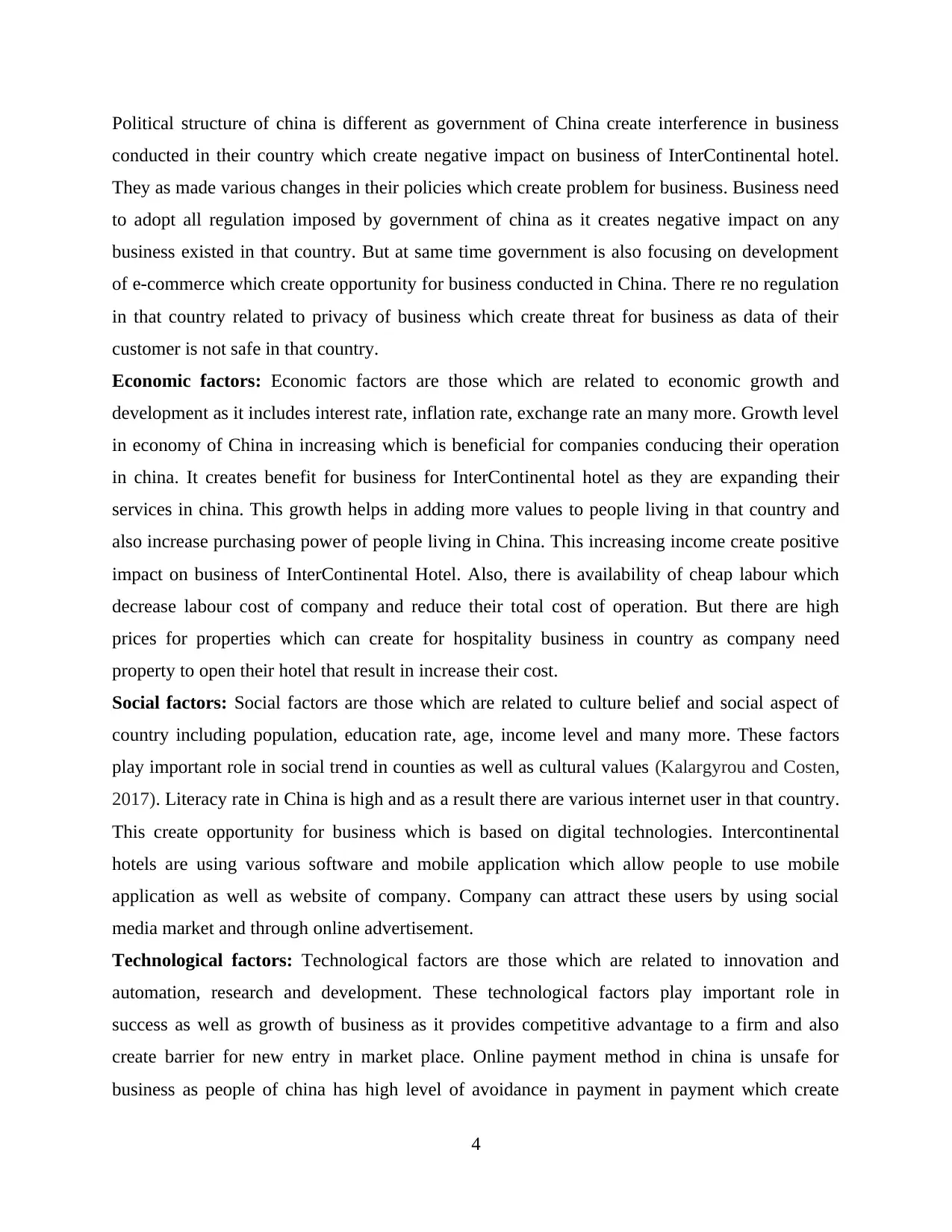
Political structure of china is different as government of China create interference in business
conducted in their country which create negative impact on business of InterContinental hotel.
They as made various changes in their policies which create problem for business. Business need
to adopt all regulation imposed by government of china as it creates negative impact on any
business existed in that country. But at same time government is also focusing on development
of e-commerce which create opportunity for business conducted in China. There re no regulation
in that country related to privacy of business which create threat for business as data of their
customer is not safe in that country.
Economic factors: Economic factors are those which are related to economic growth and
development as it includes interest rate, inflation rate, exchange rate an many more. Growth level
in economy of China in increasing which is beneficial for companies conducing their operation
in china. It creates benefit for business for InterContinental hotel as they are expanding their
services in china. This growth helps in adding more values to people living in that country and
also increase purchasing power of people living in China. This increasing income create positive
impact on business of InterContinental Hotel. Also, there is availability of cheap labour which
decrease labour cost of company and reduce their total cost of operation. But there are high
prices for properties which can create for hospitality business in country as company need
property to open their hotel that result in increase their cost.
Social factors: Social factors are those which are related to culture belief and social aspect of
country including population, education rate, age, income level and many more. These factors
play important role in social trend in counties as well as cultural values (Kalargyrou and Costen,
2017). Literacy rate in China is high and as a result there are various internet user in that country.
This create opportunity for business which is based on digital technologies. Intercontinental
hotels are using various software and mobile application which allow people to use mobile
application as well as website of company. Company can attract these users by using social
media market and through online advertisement.
Technological factors: Technological factors are those which are related to innovation and
automation, research and development. These technological factors play important role in
success as well as growth of business as it provides competitive advantage to a firm and also
create barrier for new entry in market place. Online payment method in china is unsafe for
business as people of china has high level of avoidance in payment in payment which create
4
conducted in their country which create negative impact on business of InterContinental hotel.
They as made various changes in their policies which create problem for business. Business need
to adopt all regulation imposed by government of china as it creates negative impact on any
business existed in that country. But at same time government is also focusing on development
of e-commerce which create opportunity for business conducted in China. There re no regulation
in that country related to privacy of business which create threat for business as data of their
customer is not safe in that country.
Economic factors: Economic factors are those which are related to economic growth and
development as it includes interest rate, inflation rate, exchange rate an many more. Growth level
in economy of China in increasing which is beneficial for companies conducing their operation
in china. It creates benefit for business for InterContinental hotel as they are expanding their
services in china. This growth helps in adding more values to people living in that country and
also increase purchasing power of people living in China. This increasing income create positive
impact on business of InterContinental Hotel. Also, there is availability of cheap labour which
decrease labour cost of company and reduce their total cost of operation. But there are high
prices for properties which can create for hospitality business in country as company need
property to open their hotel that result in increase their cost.
Social factors: Social factors are those which are related to culture belief and social aspect of
country including population, education rate, age, income level and many more. These factors
play important role in social trend in counties as well as cultural values (Kalargyrou and Costen,
2017). Literacy rate in China is high and as a result there are various internet user in that country.
This create opportunity for business which is based on digital technologies. Intercontinental
hotels are using various software and mobile application which allow people to use mobile
application as well as website of company. Company can attract these users by using social
media market and through online advertisement.
Technological factors: Technological factors are those which are related to innovation and
automation, research and development. These technological factors play important role in
success as well as growth of business as it provides competitive advantage to a firm and also
create barrier for new entry in market place. Online payment method in china is unsafe for
business as people of china has high level of avoidance in payment in payment which create
4
⊘ This is a preview!⊘
Do you want full access?
Subscribe today to unlock all pages.

Trusted by 1+ million students worldwide
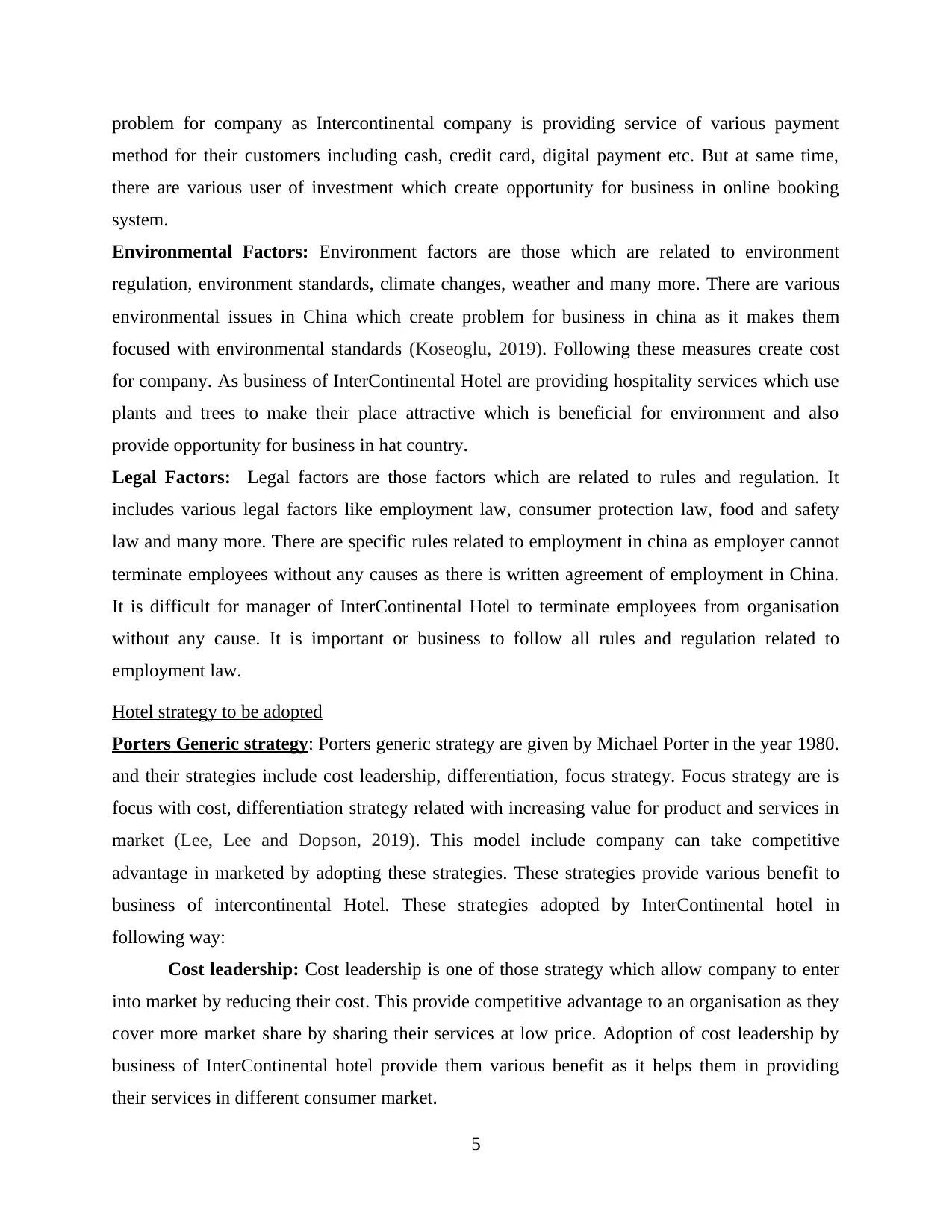
problem for company as Intercontinental company is providing service of various payment
method for their customers including cash, credit card, digital payment etc. But at same time,
there are various user of investment which create opportunity for business in online booking
system.
Environmental Factors: Environment factors are those which are related to environment
regulation, environment standards, climate changes, weather and many more. There are various
environmental issues in China which create problem for business in china as it makes them
focused with environmental standards (Koseoglu, 2019). Following these measures create cost
for company. As business of InterContinental Hotel are providing hospitality services which use
plants and trees to make their place attractive which is beneficial for environment and also
provide opportunity for business in hat country.
Legal Factors: Legal factors are those factors which are related to rules and regulation. It
includes various legal factors like employment law, consumer protection law, food and safety
law and many more. There are specific rules related to employment in china as employer cannot
terminate employees without any causes as there is written agreement of employment in China.
It is difficult for manager of InterContinental Hotel to terminate employees from organisation
without any cause. It is important or business to follow all rules and regulation related to
employment law.
Hotel strategy to be adopted
Porters Generic strategy: Porters generic strategy are given by Michael Porter in the year 1980.
and their strategies include cost leadership, differentiation, focus strategy. Focus strategy are is
focus with cost, differentiation strategy related with increasing value for product and services in
market (Lee, Lee and Dopson, 2019). This model include company can take competitive
advantage in marketed by adopting these strategies. These strategies provide various benefit to
business of intercontinental Hotel. These strategies adopted by InterContinental hotel in
following way:
Cost leadership: Cost leadership is one of those strategy which allow company to enter
into market by reducing their cost. This provide competitive advantage to an organisation as they
cover more market share by sharing their services at low price. Adoption of cost leadership by
business of InterContinental hotel provide them various benefit as it helps them in providing
their services in different consumer market.
5
method for their customers including cash, credit card, digital payment etc. But at same time,
there are various user of investment which create opportunity for business in online booking
system.
Environmental Factors: Environment factors are those which are related to environment
regulation, environment standards, climate changes, weather and many more. There are various
environmental issues in China which create problem for business in china as it makes them
focused with environmental standards (Koseoglu, 2019). Following these measures create cost
for company. As business of InterContinental Hotel are providing hospitality services which use
plants and trees to make their place attractive which is beneficial for environment and also
provide opportunity for business in hat country.
Legal Factors: Legal factors are those factors which are related to rules and regulation. It
includes various legal factors like employment law, consumer protection law, food and safety
law and many more. There are specific rules related to employment in china as employer cannot
terminate employees without any causes as there is written agreement of employment in China.
It is difficult for manager of InterContinental Hotel to terminate employees from organisation
without any cause. It is important or business to follow all rules and regulation related to
employment law.
Hotel strategy to be adopted
Porters Generic strategy: Porters generic strategy are given by Michael Porter in the year 1980.
and their strategies include cost leadership, differentiation, focus strategy. Focus strategy are is
focus with cost, differentiation strategy related with increasing value for product and services in
market (Lee, Lee and Dopson, 2019). This model include company can take competitive
advantage in marketed by adopting these strategies. These strategies provide various benefit to
business of intercontinental Hotel. These strategies adopted by InterContinental hotel in
following way:
Cost leadership: Cost leadership is one of those strategy which allow company to enter
into market by reducing their cost. This provide competitive advantage to an organisation as they
cover more market share by sharing their services at low price. Adoption of cost leadership by
business of InterContinental hotel provide them various benefit as it helps them in providing
their services in different consumer market.
5
Paraphrase This Document
Need a fresh take? Get an instant paraphrase of this document with our AI Paraphraser
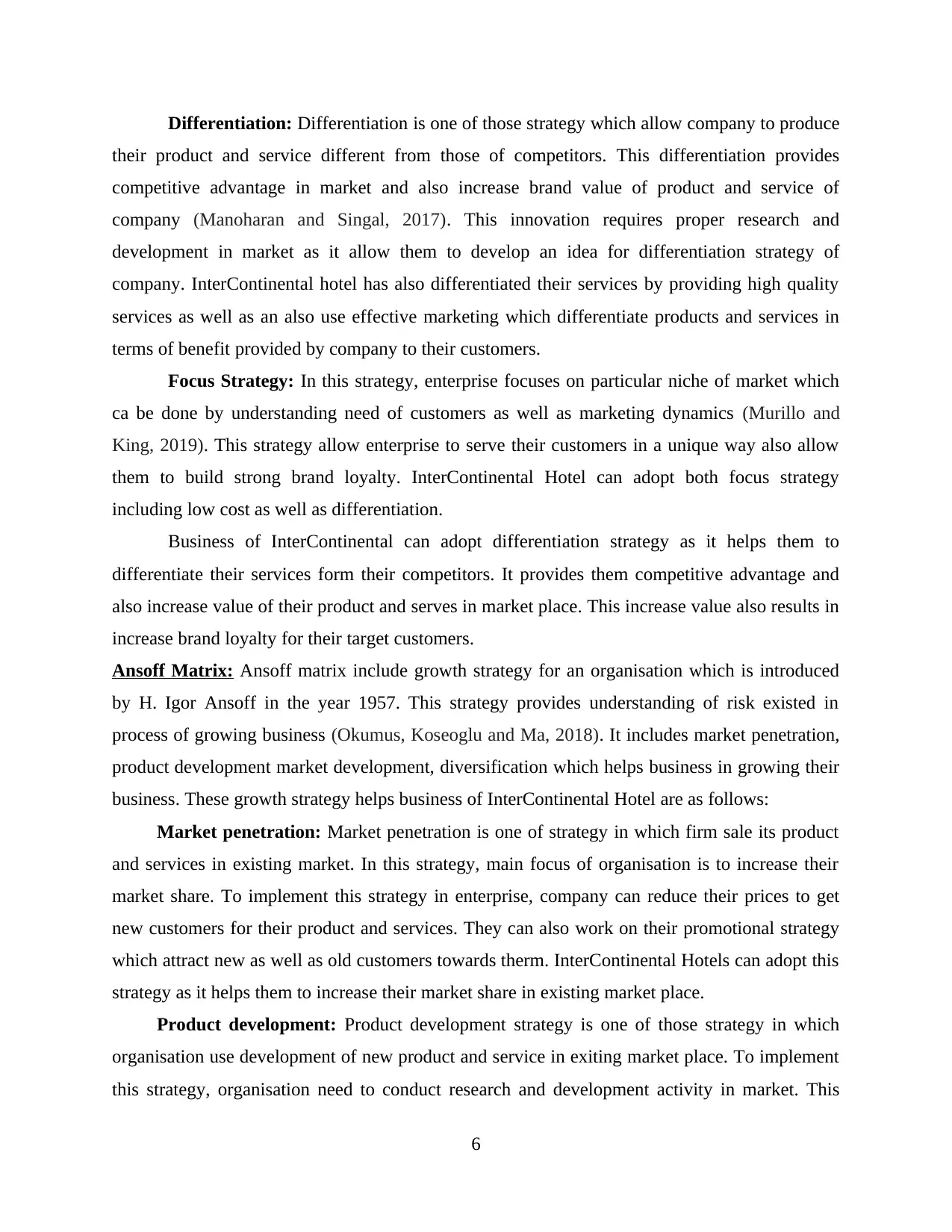
Differentiation: Differentiation is one of those strategy which allow company to produce
their product and service different from those of competitors. This differentiation provides
competitive advantage in market and also increase brand value of product and service of
company (Manoharan and Singal, 2017). This innovation requires proper research and
development in market as it allow them to develop an idea for differentiation strategy of
company. InterContinental hotel has also differentiated their services by providing high quality
services as well as an also use effective marketing which differentiate products and services in
terms of benefit provided by company to their customers.
Focus Strategy: In this strategy, enterprise focuses on particular niche of market which
ca be done by understanding need of customers as well as marketing dynamics (Murillo and
King, 2019). This strategy allow enterprise to serve their customers in a unique way also allow
them to build strong brand loyalty. InterContinental Hotel can adopt both focus strategy
including low cost as well as differentiation.
Business of InterContinental can adopt differentiation strategy as it helps them to
differentiate their services form their competitors. It provides them competitive advantage and
also increase value of their product and serves in market place. This increase value also results in
increase brand loyalty for their target customers.
Ansoff Matrix: Ansoff matrix include growth strategy for an organisation which is introduced
by H. Igor Ansoff in the year 1957. This strategy provides understanding of risk existed in
process of growing business (Okumus, Koseoglu and Ma, 2018). It includes market penetration,
product development market development, diversification which helps business in growing their
business. These growth strategy helps business of InterContinental Hotel are as follows:
Market penetration: Market penetration is one of strategy in which firm sale its product
and services in existing market. In this strategy, main focus of organisation is to increase their
market share. To implement this strategy in enterprise, company can reduce their prices to get
new customers for their product and services. They can also work on their promotional strategy
which attract new as well as old customers towards therm. InterContinental Hotels can adopt this
strategy as it helps them to increase their market share in existing market place.
Product development: Product development strategy is one of those strategy in which
organisation use development of new product and service in exiting market place. To implement
this strategy, organisation need to conduct research and development activity in market. This
6
their product and service different from those of competitors. This differentiation provides
competitive advantage in market and also increase brand value of product and service of
company (Manoharan and Singal, 2017). This innovation requires proper research and
development in market as it allow them to develop an idea for differentiation strategy of
company. InterContinental hotel has also differentiated their services by providing high quality
services as well as an also use effective marketing which differentiate products and services in
terms of benefit provided by company to their customers.
Focus Strategy: In this strategy, enterprise focuses on particular niche of market which
ca be done by understanding need of customers as well as marketing dynamics (Murillo and
King, 2019). This strategy allow enterprise to serve their customers in a unique way also allow
them to build strong brand loyalty. InterContinental Hotel can adopt both focus strategy
including low cost as well as differentiation.
Business of InterContinental can adopt differentiation strategy as it helps them to
differentiate their services form their competitors. It provides them competitive advantage and
also increase value of their product and serves in market place. This increase value also results in
increase brand loyalty for their target customers.
Ansoff Matrix: Ansoff matrix include growth strategy for an organisation which is introduced
by H. Igor Ansoff in the year 1957. This strategy provides understanding of risk existed in
process of growing business (Okumus, Koseoglu and Ma, 2018). It includes market penetration,
product development market development, diversification which helps business in growing their
business. These growth strategy helps business of InterContinental Hotel are as follows:
Market penetration: Market penetration is one of strategy in which firm sale its product
and services in existing market. In this strategy, main focus of organisation is to increase their
market share. To implement this strategy in enterprise, company can reduce their prices to get
new customers for their product and services. They can also work on their promotional strategy
which attract new as well as old customers towards therm. InterContinental Hotels can adopt this
strategy as it helps them to increase their market share in existing market place.
Product development: Product development strategy is one of those strategy in which
organisation use development of new product and service in exiting market place. To implement
this strategy, organisation need to conduct research and development activity in market. This
6
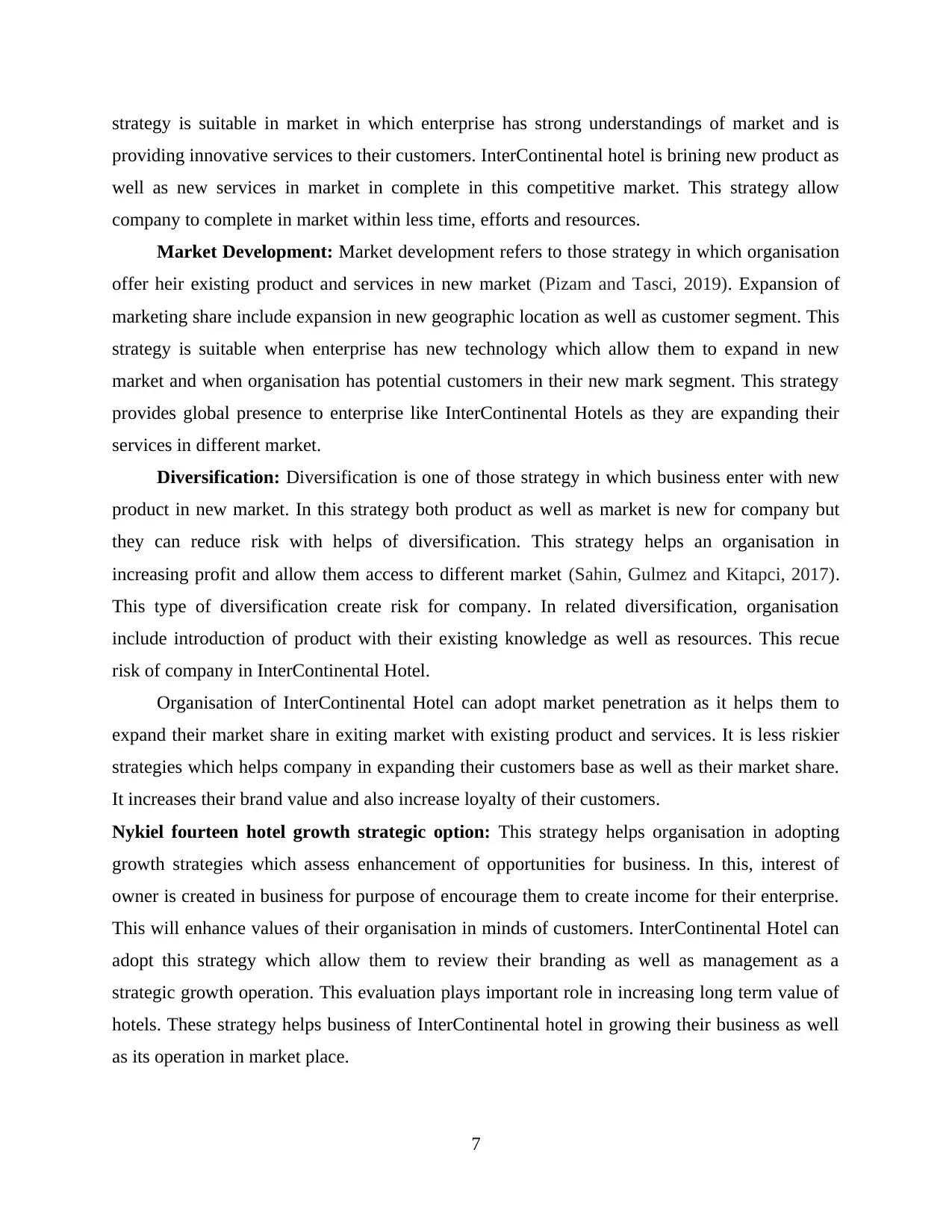
strategy is suitable in market in which enterprise has strong understandings of market and is
providing innovative services to their customers. InterContinental hotel is brining new product as
well as new services in market in complete in this competitive market. This strategy allow
company to complete in market within less time, efforts and resources.
Market Development: Market development refers to those strategy in which organisation
offer heir existing product and services in new market (Pizam and Tasci, 2019). Expansion of
marketing share include expansion in new geographic location as well as customer segment. This
strategy is suitable when enterprise has new technology which allow them to expand in new
market and when organisation has potential customers in their new mark segment. This strategy
provides global presence to enterprise like InterContinental Hotels as they are expanding their
services in different market.
Diversification: Diversification is one of those strategy in which business enter with new
product in new market. In this strategy both product as well as market is new for company but
they can reduce risk with helps of diversification. This strategy helps an organisation in
increasing profit and allow them access to different market (Sahin, Gulmez and Kitapci, 2017).
This type of diversification create risk for company. In related diversification, organisation
include introduction of product with their existing knowledge as well as resources. This recue
risk of company in InterContinental Hotel.
Organisation of InterContinental Hotel can adopt market penetration as it helps them to
expand their market share in exiting market with existing product and services. It is less riskier
strategies which helps company in expanding their customers base as well as their market share.
It increases their brand value and also increase loyalty of their customers.
Nykiel fourteen hotel growth strategic option: This strategy helps organisation in adopting
growth strategies which assess enhancement of opportunities for business. In this, interest of
owner is created in business for purpose of encourage them to create income for their enterprise.
This will enhance values of their organisation in minds of customers. InterContinental Hotel can
adopt this strategy which allow them to review their branding as well as management as a
strategic growth operation. This evaluation plays important role in increasing long term value of
hotels. These strategy helps business of InterContinental hotel in growing their business as well
as its operation in market place.
7
providing innovative services to their customers. InterContinental hotel is brining new product as
well as new services in market in complete in this competitive market. This strategy allow
company to complete in market within less time, efforts and resources.
Market Development: Market development refers to those strategy in which organisation
offer heir existing product and services in new market (Pizam and Tasci, 2019). Expansion of
marketing share include expansion in new geographic location as well as customer segment. This
strategy is suitable when enterprise has new technology which allow them to expand in new
market and when organisation has potential customers in their new mark segment. This strategy
provides global presence to enterprise like InterContinental Hotels as they are expanding their
services in different market.
Diversification: Diversification is one of those strategy in which business enter with new
product in new market. In this strategy both product as well as market is new for company but
they can reduce risk with helps of diversification. This strategy helps an organisation in
increasing profit and allow them access to different market (Sahin, Gulmez and Kitapci, 2017).
This type of diversification create risk for company. In related diversification, organisation
include introduction of product with their existing knowledge as well as resources. This recue
risk of company in InterContinental Hotel.
Organisation of InterContinental Hotel can adopt market penetration as it helps them to
expand their market share in exiting market with existing product and services. It is less riskier
strategies which helps company in expanding their customers base as well as their market share.
It increases their brand value and also increase loyalty of their customers.
Nykiel fourteen hotel growth strategic option: This strategy helps organisation in adopting
growth strategies which assess enhancement of opportunities for business. In this, interest of
owner is created in business for purpose of encourage them to create income for their enterprise.
This will enhance values of their organisation in minds of customers. InterContinental Hotel can
adopt this strategy which allow them to review their branding as well as management as a
strategic growth operation. This evaluation plays important role in increasing long term value of
hotels. These strategy helps business of InterContinental hotel in growing their business as well
as its operation in market place.
7
⊘ This is a preview!⊘
Do you want full access?
Subscribe today to unlock all pages.

Trusted by 1+ million students worldwide
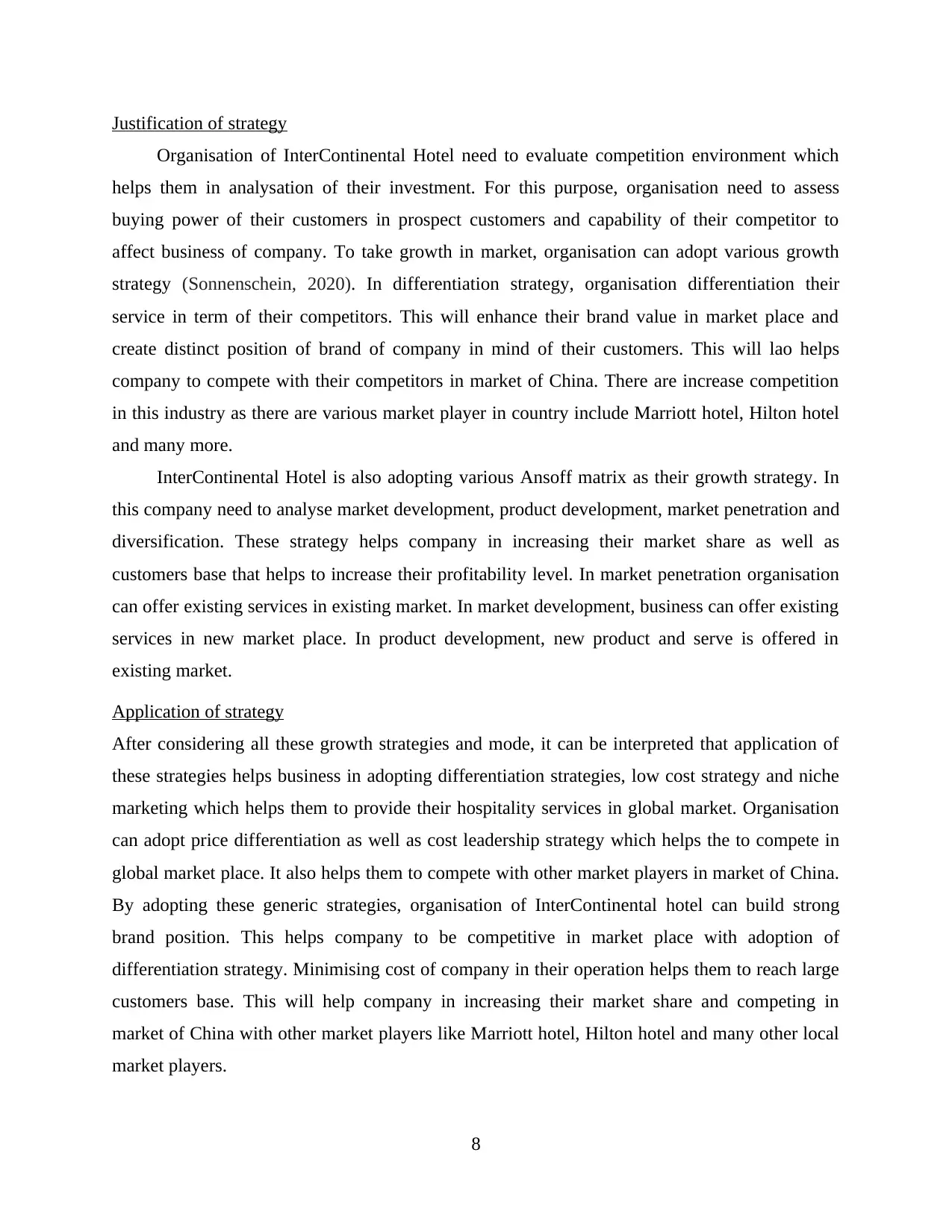
Justification of strategy
Organisation of InterContinental Hotel need to evaluate competition environment which
helps them in analysation of their investment. For this purpose, organisation need to assess
buying power of their customers in prospect customers and capability of their competitor to
affect business of company. To take growth in market, organisation can adopt various growth
strategy (Sonnenschein, 2020). In differentiation strategy, organisation differentiation their
service in term of their competitors. This will enhance their brand value in market place and
create distinct position of brand of company in mind of their customers. This will lao helps
company to compete with their competitors in market of China. There are increase competition
in this industry as there are various market player in country include Marriott hotel, Hilton hotel
and many more.
InterContinental Hotel is also adopting various Ansoff matrix as their growth strategy. In
this company need to analyse market development, product development, market penetration and
diversification. These strategy helps company in increasing their market share as well as
customers base that helps to increase their profitability level. In market penetration organisation
can offer existing services in existing market. In market development, business can offer existing
services in new market place. In product development, new product and serve is offered in
existing market.
Application of strategy
After considering all these growth strategies and mode, it can be interpreted that application of
these strategies helps business in adopting differentiation strategies, low cost strategy and niche
marketing which helps them to provide their hospitality services in global market. Organisation
can adopt price differentiation as well as cost leadership strategy which helps the to compete in
global market place. It also helps them to compete with other market players in market of China.
By adopting these generic strategies, organisation of InterContinental hotel can build strong
brand position. This helps company to be competitive in market place with adoption of
differentiation strategy. Minimising cost of company in their operation helps them to reach large
customers base. This will help company in increasing their market share and competing in
market of China with other market players like Marriott hotel, Hilton hotel and many other local
market players.
8
Organisation of InterContinental Hotel need to evaluate competition environment which
helps them in analysation of their investment. For this purpose, organisation need to assess
buying power of their customers in prospect customers and capability of their competitor to
affect business of company. To take growth in market, organisation can adopt various growth
strategy (Sonnenschein, 2020). In differentiation strategy, organisation differentiation their
service in term of their competitors. This will enhance their brand value in market place and
create distinct position of brand of company in mind of their customers. This will lao helps
company to compete with their competitors in market of China. There are increase competition
in this industry as there are various market player in country include Marriott hotel, Hilton hotel
and many more.
InterContinental Hotel is also adopting various Ansoff matrix as their growth strategy. In
this company need to analyse market development, product development, market penetration and
diversification. These strategy helps company in increasing their market share as well as
customers base that helps to increase their profitability level. In market penetration organisation
can offer existing services in existing market. In market development, business can offer existing
services in new market place. In product development, new product and serve is offered in
existing market.
Application of strategy
After considering all these growth strategies and mode, it can be interpreted that application of
these strategies helps business in adopting differentiation strategies, low cost strategy and niche
marketing which helps them to provide their hospitality services in global market. Organisation
can adopt price differentiation as well as cost leadership strategy which helps the to compete in
global market place. It also helps them to compete with other market players in market of China.
By adopting these generic strategies, organisation of InterContinental hotel can build strong
brand position. This helps company to be competitive in market place with adoption of
differentiation strategy. Minimising cost of company in their operation helps them to reach large
customers base. This will help company in increasing their market share and competing in
market of China with other market players like Marriott hotel, Hilton hotel and many other local
market players.
8
Paraphrase This Document
Need a fresh take? Get an instant paraphrase of this document with our AI Paraphraser
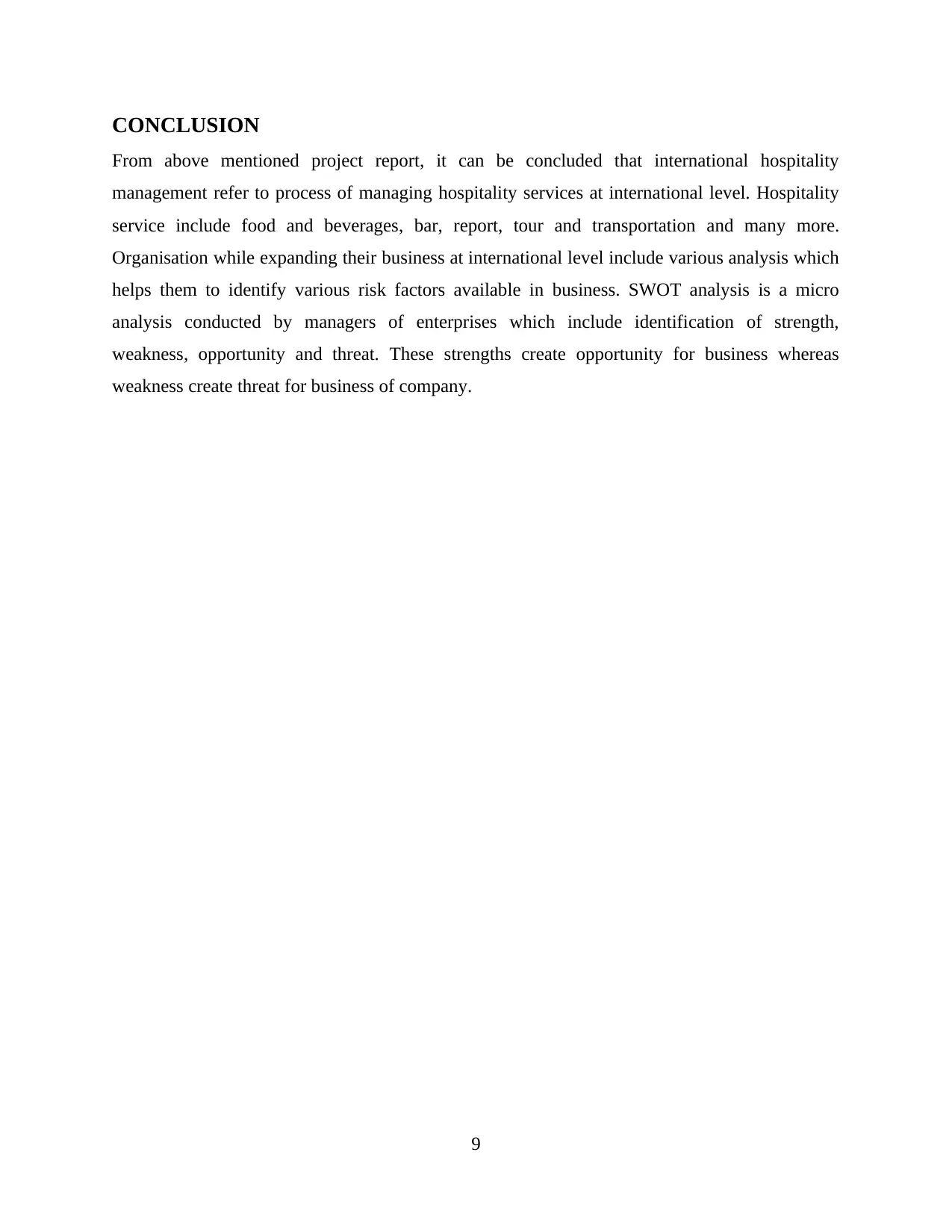
CONCLUSION
From above mentioned project report, it can be concluded that international hospitality
management refer to process of managing hospitality services at international level. Hospitality
service include food and beverages, bar, report, tour and transportation and many more.
Organisation while expanding their business at international level include various analysis which
helps them to identify various risk factors available in business. SWOT analysis is a micro
analysis conducted by managers of enterprises which include identification of strength,
weakness, opportunity and threat. These strengths create opportunity for business whereas
weakness create threat for business of company.
9
From above mentioned project report, it can be concluded that international hospitality
management refer to process of managing hospitality services at international level. Hospitality
service include food and beverages, bar, report, tour and transportation and many more.
Organisation while expanding their business at international level include various analysis which
helps them to identify various risk factors available in business. SWOT analysis is a micro
analysis conducted by managers of enterprises which include identification of strength,
weakness, opportunity and threat. These strengths create opportunity for business whereas
weakness create threat for business of company.
9
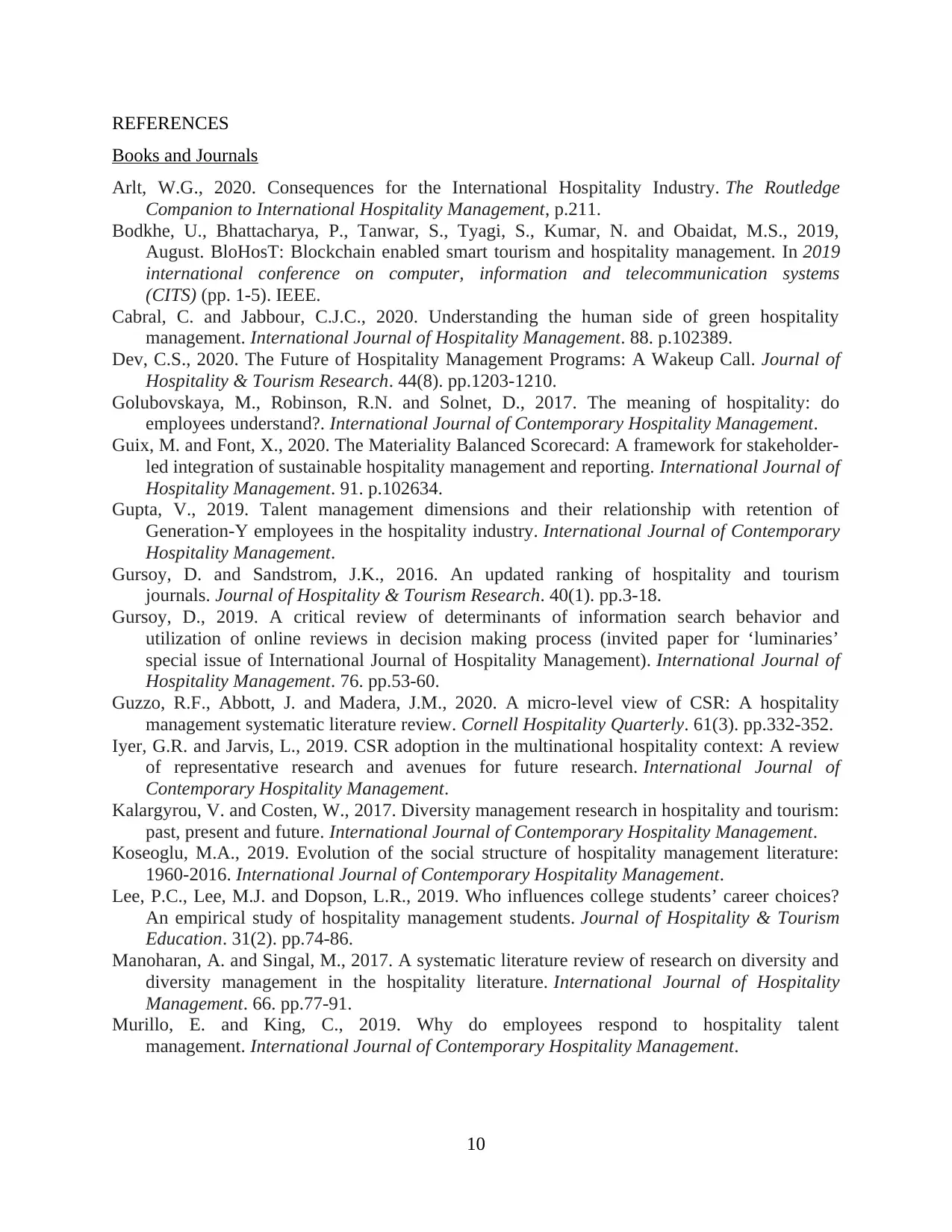
REFERENCES
Books and Journals
Arlt, W.G., 2020. Consequences for the International Hospitality Industry. The Routledge
Companion to International Hospitality Management, p.211.
Bodkhe, U., Bhattacharya, P., Tanwar, S., Tyagi, S., Kumar, N. and Obaidat, M.S., 2019,
August. BloHosT: Blockchain enabled smart tourism and hospitality management. In 2019
international conference on computer, information and telecommunication systems
(CITS) (pp. 1-5). IEEE.
Cabral, C. and Jabbour, C.J.C., 2020. Understanding the human side of green hospitality
management. International Journal of Hospitality Management. 88. p.102389.
Dev, C.S., 2020. The Future of Hospitality Management Programs: A Wakeup Call. Journal of
Hospitality & Tourism Research. 44(8). pp.1203-1210.
Golubovskaya, M., Robinson, R.N. and Solnet, D., 2017. The meaning of hospitality: do
employees understand?. International Journal of Contemporary Hospitality Management.
Guix, M. and Font, X., 2020. The Materiality Balanced Scorecard: A framework for stakeholder-
led integration of sustainable hospitality management and reporting. International Journal of
Hospitality Management. 91. p.102634.
Gupta, V., 2019. Talent management dimensions and their relationship with retention of
Generation-Y employees in the hospitality industry. International Journal of Contemporary
Hospitality Management.
Gursoy, D. and Sandstrom, J.K., 2016. An updated ranking of hospitality and tourism
journals. Journal of Hospitality & Tourism Research. 40(1). pp.3-18.
Gursoy, D., 2019. A critical review of determinants of information search behavior and
utilization of online reviews in decision making process (invited paper for ‘luminaries’
special issue of International Journal of Hospitality Management). International Journal of
Hospitality Management. 76. pp.53-60.
Guzzo, R.F., Abbott, J. and Madera, J.M., 2020. A micro-level view of CSR: A hospitality
management systematic literature review. Cornell Hospitality Quarterly. 61(3). pp.332-352.
Iyer, G.R. and Jarvis, L., 2019. CSR adoption in the multinational hospitality context: A review
of representative research and avenues for future research. International Journal of
Contemporary Hospitality Management.
Kalargyrou, V. and Costen, W., 2017. Diversity management research in hospitality and tourism:
past, present and future. International Journal of Contemporary Hospitality Management.
Koseoglu, M.A., 2019. Evolution of the social structure of hospitality management literature:
1960-2016. International Journal of Contemporary Hospitality Management.
Lee, P.C., Lee, M.J. and Dopson, L.R., 2019. Who influences college students’ career choices?
An empirical study of hospitality management students. Journal of Hospitality & Tourism
Education. 31(2). pp.74-86.
Manoharan, A. and Singal, M., 2017. A systematic literature review of research on diversity and
diversity management in the hospitality literature. International Journal of Hospitality
Management. 66. pp.77-91.
Murillo, E. and King, C., 2019. Why do employees respond to hospitality talent
management. International Journal of Contemporary Hospitality Management.
10
Books and Journals
Arlt, W.G., 2020. Consequences for the International Hospitality Industry. The Routledge
Companion to International Hospitality Management, p.211.
Bodkhe, U., Bhattacharya, P., Tanwar, S., Tyagi, S., Kumar, N. and Obaidat, M.S., 2019,
August. BloHosT: Blockchain enabled smart tourism and hospitality management. In 2019
international conference on computer, information and telecommunication systems
(CITS) (pp. 1-5). IEEE.
Cabral, C. and Jabbour, C.J.C., 2020. Understanding the human side of green hospitality
management. International Journal of Hospitality Management. 88. p.102389.
Dev, C.S., 2020. The Future of Hospitality Management Programs: A Wakeup Call. Journal of
Hospitality & Tourism Research. 44(8). pp.1203-1210.
Golubovskaya, M., Robinson, R.N. and Solnet, D., 2017. The meaning of hospitality: do
employees understand?. International Journal of Contemporary Hospitality Management.
Guix, M. and Font, X., 2020. The Materiality Balanced Scorecard: A framework for stakeholder-
led integration of sustainable hospitality management and reporting. International Journal of
Hospitality Management. 91. p.102634.
Gupta, V., 2019. Talent management dimensions and their relationship with retention of
Generation-Y employees in the hospitality industry. International Journal of Contemporary
Hospitality Management.
Gursoy, D. and Sandstrom, J.K., 2016. An updated ranking of hospitality and tourism
journals. Journal of Hospitality & Tourism Research. 40(1). pp.3-18.
Gursoy, D., 2019. A critical review of determinants of information search behavior and
utilization of online reviews in decision making process (invited paper for ‘luminaries’
special issue of International Journal of Hospitality Management). International Journal of
Hospitality Management. 76. pp.53-60.
Guzzo, R.F., Abbott, J. and Madera, J.M., 2020. A micro-level view of CSR: A hospitality
management systematic literature review. Cornell Hospitality Quarterly. 61(3). pp.332-352.
Iyer, G.R. and Jarvis, L., 2019. CSR adoption in the multinational hospitality context: A review
of representative research and avenues for future research. International Journal of
Contemporary Hospitality Management.
Kalargyrou, V. and Costen, W., 2017. Diversity management research in hospitality and tourism:
past, present and future. International Journal of Contemporary Hospitality Management.
Koseoglu, M.A., 2019. Evolution of the social structure of hospitality management literature:
1960-2016. International Journal of Contemporary Hospitality Management.
Lee, P.C., Lee, M.J. and Dopson, L.R., 2019. Who influences college students’ career choices?
An empirical study of hospitality management students. Journal of Hospitality & Tourism
Education. 31(2). pp.74-86.
Manoharan, A. and Singal, M., 2017. A systematic literature review of research on diversity and
diversity management in the hospitality literature. International Journal of Hospitality
Management. 66. pp.77-91.
Murillo, E. and King, C., 2019. Why do employees respond to hospitality talent
management. International Journal of Contemporary Hospitality Management.
10
⊘ This is a preview!⊘
Do you want full access?
Subscribe today to unlock all pages.

Trusted by 1+ million students worldwide
1 out of 13
Related Documents
Your All-in-One AI-Powered Toolkit for Academic Success.
+13062052269
info@desklib.com
Available 24*7 on WhatsApp / Email
![[object Object]](/_next/static/media/star-bottom.7253800d.svg)
Unlock your academic potential
Copyright © 2020–2026 A2Z Services. All Rights Reserved. Developed and managed by ZUCOL.




